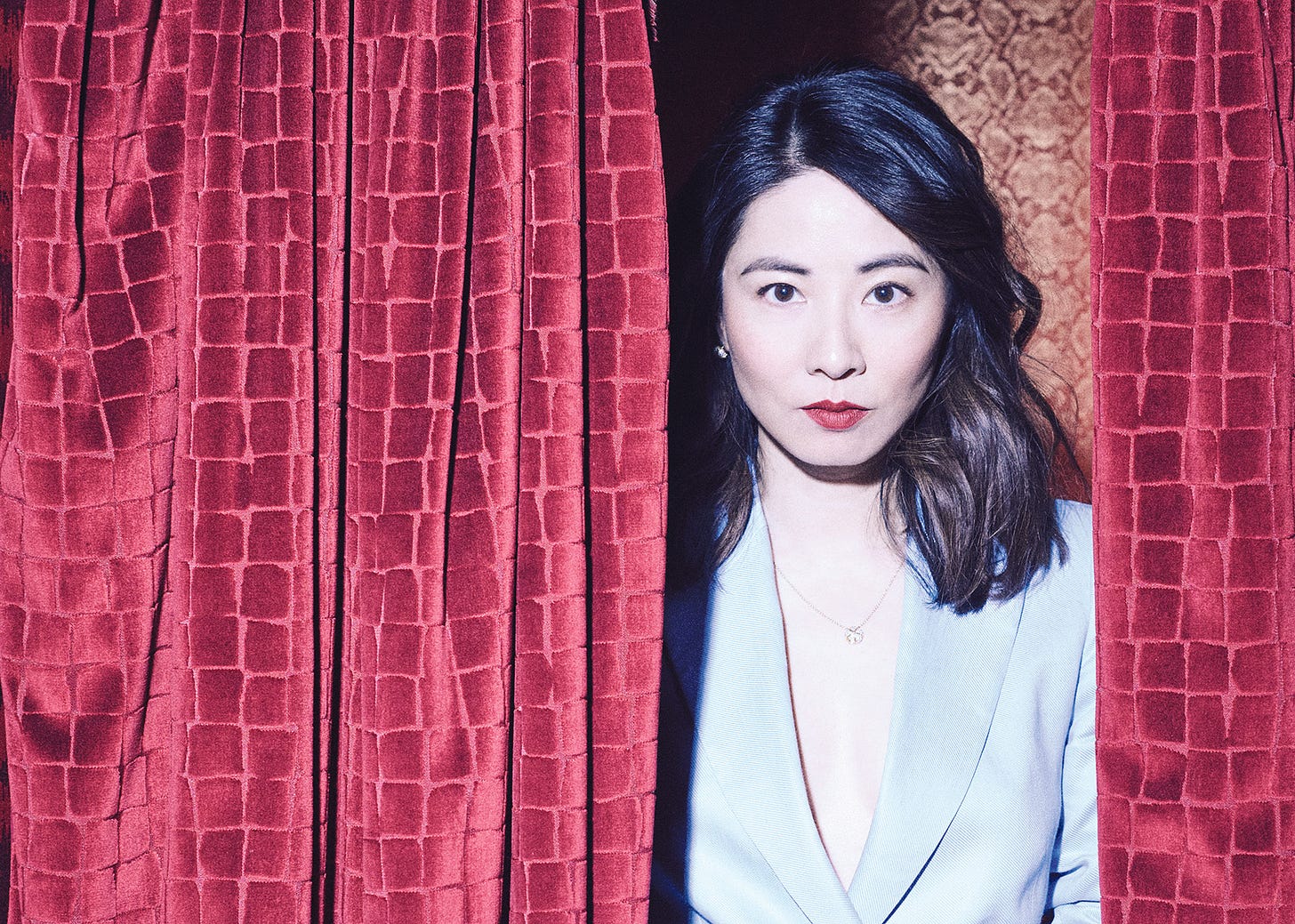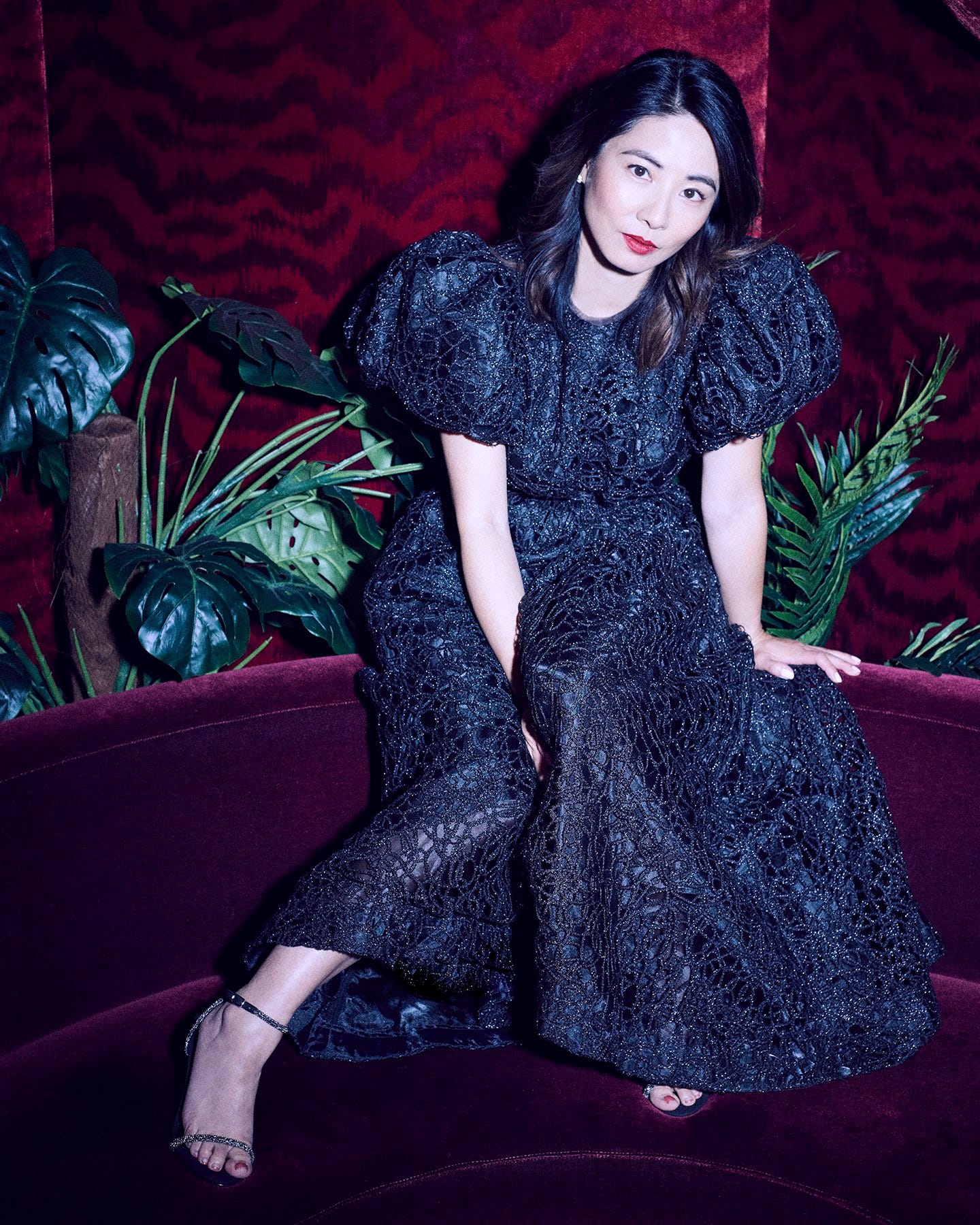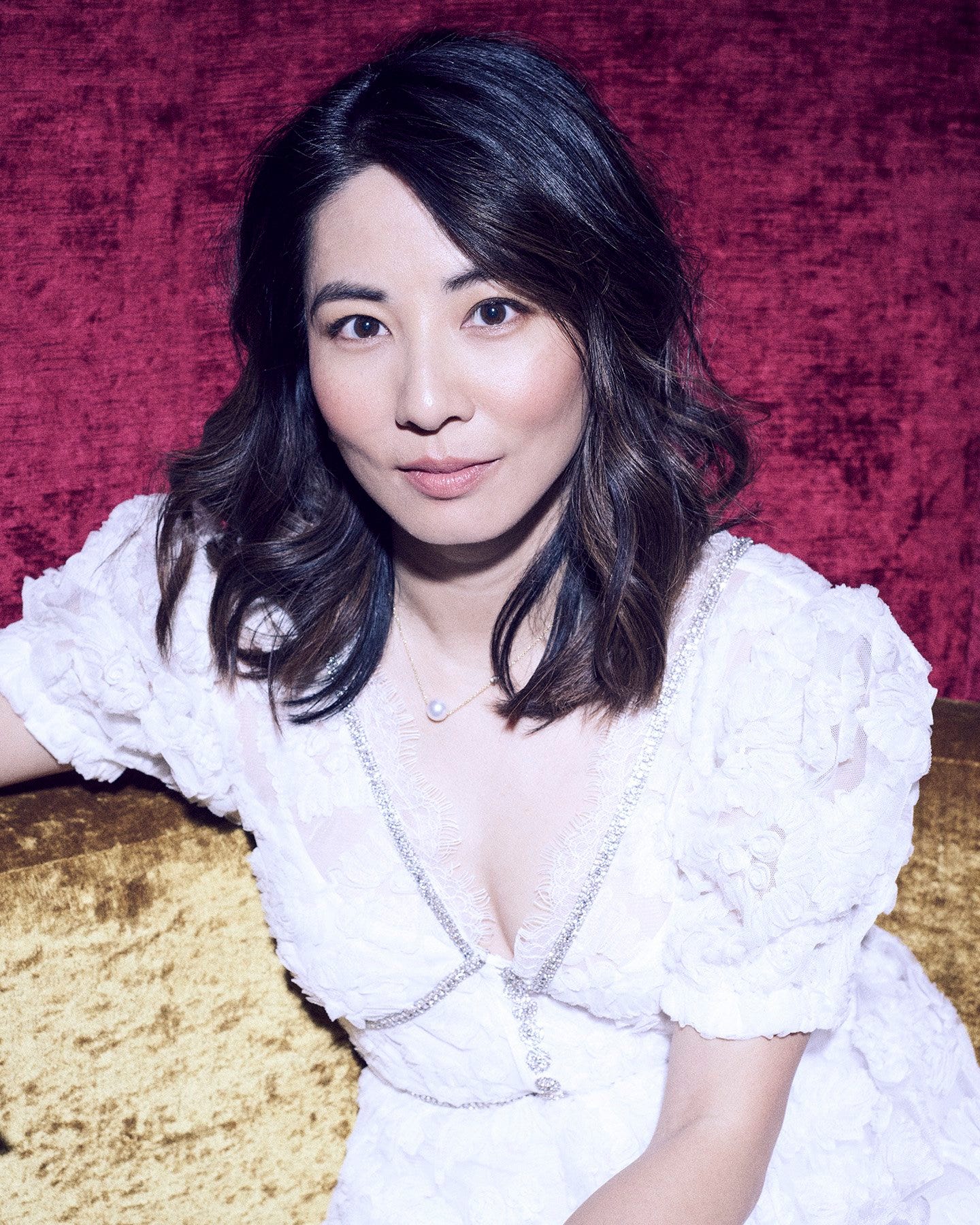Jing Lusi - Funny Girl
Since turning her back on a career in law to pursue her dream of becoming an actor, Jing Lusi hasn’t looked back, appearing in rom-com juggernaut Crazy Rich Asians along the way.
Interview Philip Goodfellow
Photography Perry Curties
When Jing Lusi’s musically inclined primary school teacher found out that Joseph and the Amazing Technicolour Dreamcoat would be coming to Southampton, where Jing’s Chinese parents had relocated to after her father secured a scholarship to study at the university, she immediately urged her pupils to get involved. Before Jing knew it, she had successfully auditioned and found herself in the show. ‘It was pure liberation,’ she recalls. ‘It’s a show where there’s no dialogue, just music and dancing throughout, with a live orchestra pit. It’s so feel-good.’ Jing spent seven weeks performing in the show, by the end of which she was in little doubt that, whatever that was, it was exactly what she needed to be doing when she grew up, even convincing herself that the ten pounds a week she was being paid would be plenty to live on. It wasn’t long though before elation started to turn to disillusionment, as the disappointment and grind of failed auditions and weekend stage school gradually took a toll on her aspirations.
Jing’s thoughts turned to more academic endeavours, eventually leading to her studying Law at university. ‘I was like “Right, OK. I’m an only child, I’m Asian, there’s a lot of pressure – Law”.’ The desire to perform never fully diminished though; Jing just kept it to herself. ‘I never really spoke about it again. When I graduated, my Law friends were like “You never talked about acting”. It was so serious to me that I didn’t really want to tell people about it in case they shat on it. At that time as well, when I was at uni, Big Brother and The X Factor were coming through and it was as though “I want to be an actress” was synonymous with “I want to be famous” and that wasn’t my aspiration, so I just kept it a secret. I didn’t want people to judge or mock.’ Jing graduated with a good degree, but that only served to bring about very mixed feelings. ‘It would have been easier I think if I had flunked my degree, because then I’d have been like “There’s no option”, but because I had the option of actually becoming a lawyer, it was very difficult to actually go “That’s the end of that journey, we’re now going to pick up what my childhood self wanted to do”.’
The decision proved to be the right one though, a varied array of film and TV roles – including Stan Lee’s Lucky Man – ensuring that Jing has worked steadily since that time and her international profile was raised considerably in 2018 by her appearance as Amanda in the hit romantic comedy Crazy Rich Asians. Whilst reading the script for the first time, Jing recalls being wowed by the Asian female characters – the likes of which hadn’t been seen before – and she knew early on that the film was going to be a game changer. She also knew who the main roles were most likely to go to. ‘In my mind, I was like “Surely this is going to go to Constance Wu” – I just saw her in there – and of course it did, then they asked me to audition for the role of Astrid and that time I was like “Surely this is Gemma” and it went to Gemma (Chan). Then finally I auditioned for Amanda. It’s funny how it is such a small pool that you know where these characters are going.’ The audition process ended up being fairly drawn out and Jing didn’t get to meet director Jon Chu until she had been cast and was on location in Kuala Lumpur. ‘When I got onto the film, I was filming something else at the time and it only caught up with me later on how monumental it would be to be involved in this, especially when I got to know the cast, got to know the creatives involved and was like “Oh god, they want this to be a real moment, like a real move the needle moment”. It started hitting me that this was going to be something extraordinary. It’s always weird when you work on a project – particularly movies, because they take longer – and there’s a lag between finishing it and the world seeing it. In that space of limbo, you’re like “We’re on the cusp of…I can’t tell you about it…well, I can tell you but you won’t get it, but we’ve experienced it”, then it’s like watching the world catching up. That weird time in the middle is very odd though. I remember saying that if the world could experience a fraction of the love and the fun that we had making this film, it will be a success.’ The film was indeed a success, staying at number one for three weeks at the US box office, and the cast and crew got to relive the same levels of excitement and joy they had felt during filming. ‘We had a WhatsApp group that was going mad every weekend with the new box office and Jon Chu, in the first week, he wrote this little one liner going “Guys, our summer camp video went viral!”. Even talking about it now, it feels emotional because it was like, at some point during the process of making the movie, we just forgot we were making a movie. It was such a celebration of Asian fantasticness and we were in the location of our motherland, we were eating the food that we were born to eat and speaking a lot of our mother tongue. Such a huge, extraordinary shift within us, within the group, that we forgot we were making a movie. Then they put it together a year later and it does what it does and we were like “Holy shit, yeah! We were doing that!”. To be on that kind of pioneering revolution, where things open a lot of doors for other Asian projects and actors and artists – across the board – it was just wow.’
That sentiment of elevating and supporting Asian creatives is something clearly close to Jing’s heart and the last five years or so appear to have seen Asian actors and filmmakers receiving considerable attention and acclaim. Jing herself acknowledges that there has indeed been a positive shift, though urges caution in thinking that it’s job done. ‘There’s definitely forward momentum but you also have to be careful when people just try to push Asians into visibility. You can’t just be like “Oh, we need an Asian in this show, throw them in”. As much as I think colour-blind casting can be very positive, it also has the risk of disrespecting someone’s culture because sometimes you throw in someone from a certain cultural background and the storyline that you put them in makes no sense. So there are dangers of that, where you’re trying to be inclusive and you’re trying to be diverse, but just need to be careful that in doing so, you don’t disrespect someone’s culture or roots. Yes, visibility has definitely gone forward and that is definitely a positive thing, it’s just that the devil is in the detail. It’s like, are you putting this Asian character – or any character of colour – in there with a full life, with a full story, or are you just ticking boxes and going “We’ve filled the quota”, because that for me is not a positive move forward.’ For an actor such as Jing, this can prove to be a balancing act between wanting to increase visibility by taking on high-profile roles and ensuring that she isn’t inadvertently enabling a production’s lazy pigeonholing. ‘You just have to be really careful,’ Jing explains. ‘Everyone has different opinions about it and I respect that, but for me personally it’s like, as soon as I’m on screen you can tell that I’m Asian. There’s no mistaking that. So then I have to be very careful about the roles I pick for myself and the stories that I wish to portray.
There are many stereotypical roles out there and there’s a reason they are stereotypes, because those characters do exist and they are walks of life that people identify with and that’s absolutely fine, but for me I would rather be more discerning. I would rather take less work and be more careful about what I’m trying to present to the world. When I was coming through in the industry, all that was available was prostitutes, takeaway workers and illegal immigrants, but my parents are academics, I studied Law, my dad is a professor, so I was like “Why aren’t we seeing the academic side?”. My parents left after the Cultural Revolution, so there was a huge influx of very successful, well read Chinese immigrants that were being killed in China. Why are we only saying that Asians, or any immigrants, come here because they’re poor, they’re refugees, etc.? What about the other side of the story? So that’s kind of I guess where I’m careful wanting to place myself in that, because there’s no disguising the fact that I’m Asian, so then it’s about whether that’s something I want to bring in or not. There are some shows where the character is written as is and you need to just have some careful discussions with the producers and be like “From you’re side, that’s probably not what you mean, but from an Asian side this could potentially be an issue”. It’s a hard thing when you’re an actor though and you’re trying to bring something up without it being seen as egotistical. For me, it’s very much a protective thing; I’m trying to protect the integrity of the show, trying to protect representation. It’s really not about me. Sometimes producers are great about that, other times they’re like “You’re an actor, stay in your box”. It’s difficult because a lot of producers at that level are still white, but I’m not trying to attack anyone, I’m really trying to protect them. I’m part of this, so it’s in my interest to protect this as well. So more often than not, it’s positive, but they’re not easy conversations to have.’
Aside from Crazy Rich Asians and her recent appearance alongside (and on FaceTime to) Rowan Atkinson in the Netflix comedy series Man vs. Bee, it’s fair to say that Jing is primarily associated with dramatic roles, something she is keen to address. Jing dipped her toe into comedic waters back in 2015 and 2017 with the Edinburgh Fringe show Immigrant Diaries, a one-woman set up that saw her performing her own 10 minute set of material. ‘I enjoyed that so much; it was terrifying. I think it’s actually harder to make people laugh than it is to make them cry, because sadness and pain are quite universal, whereas making people laugh is about catching them off guard. I think it’s such an amazing skill, comedy. I have done some comedies, but there’s not enough. Man vs. Bee was great, but it’s very physical and there was a lot going on. Rowan Atkinson is an absolute comedic genius, but I didn’t really get to work with him much; he was pretty much on his own with a bee. When I was offered that though, to work with a childhood hero, that was a dream. I was recently in LA having some meetings with studios and they were like “You’re really funny! We don’t get to see that!”. It’s not really reflected in my roles. I don’t think there’s too much of an opportunity for Asians to be funny in this country. We’re not seeing them in comedy, we’re seeing them in very straight, down the line dramatic roles, but we definitely need to bring that out because we’re very funny people.”
In addition to an extremely hush-hush six part TV thriller series – a role she intriguingly describes as the one she has been waiting for since she became an actress – Jing has two major films due for release this year, both action thrillers. Based on the yet to be released novel of the same name by Elly Conway, who also co-wrote the script alongside Jason Fuchs, Argylle is directed by Matthew Vaughn and features Henry Cavill in the title role, whilst Heart of Stone is directed by Tom Harper and stars Gal Gadot and Jamie Dornan. Filmed last year, Jing describes Heart of Stone as one of the most amazing film experiences she has ever had. It also proved to be the right project at the right time. ‘The big budget helped - very different to Crazy Rich Asians. It also came at a time in my life when I just needed to have fun and let loose a little bit. I was taking myself very seriously; Covid had just happened, so I think I was reassessing and I needed a break. Before Covid, I was burnt out, working back to back, thinking that’s what I wanted, that it’s an actor’s dream to just keep working, but it wasn’t. So Covid was a reset and when we came out of that, I was being very careful of my roles. Then Heart of Stone came along and I’m so glad I did it because it was exactly what I needed, to do an action movie and get out of my head, the seriousness of the world and the intensity of drama. To work with Gal, to work with Jamie, to travel round the world – there were a lot of locations – just kicking ass, I was like “Yes, absolutely”. It’s very ambitious, everyone worked so hard and they were amazing to work with. I’m very excited for the world to see it.’
Stylist - Jay Hines
Hair & Make Up - Rachael Thomas
Shot at The Luno, KOKO, London
Heart of Stone is on Netflix now.






